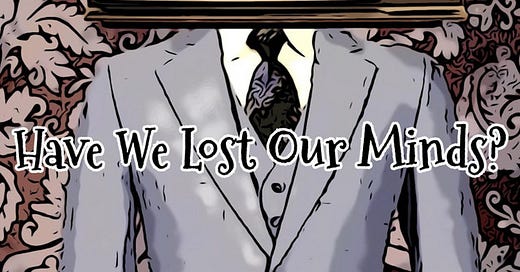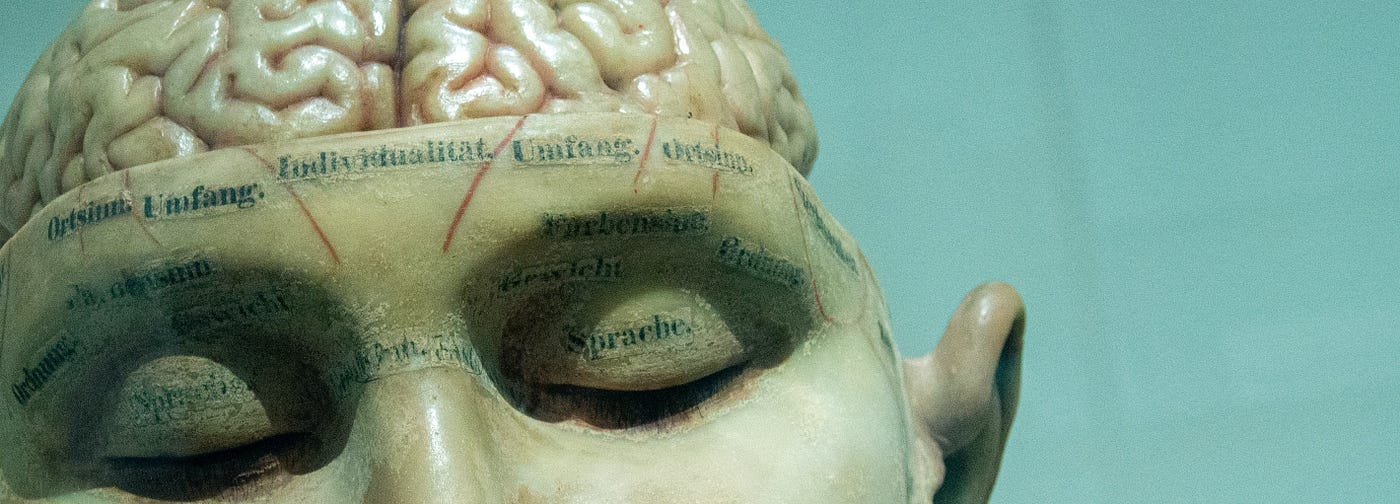The Great Disconnect: How We Lost Our Minds to Ourselves
We live in the age of the self. The ME GENERATION of the 1980’s has nothing on us. Every modern mantra—speak your truth, find your voice, be your own person—reinforces the idea that we are singular, sovereign individuals, wholly responsible for our thoughts, feelings, and destinies. But this is a deeply unnatural way to conceive of the human experience. The more we obsess over the self, the more we seem to lose touch with what that self is actually made of: the others, the world, and the invisible forces, and most importantly the sorrows and the suffering that have always shaped human consciousness - and the sadder we become.
Canadian Punk Rockers THE FORGOTTEN REBELS folksong about The Me Generation.
You Don’t Think Alone—You Never Have
Our brains are, in the most literal sense, inside our heads. We can point to them on an MRI, cut them open, weigh them, and study their cellular structures. But that’s only half the story. The other half—the part that actually defines how a brain functions and what it produces—is profoundly external. We think of the brain as an isolated organ, but in reality, it is more like a relay station, a hub constantly shaped by the other minds around it.
We imagine that our minds are inside our heads too. Seems obvious, right? You have your mind, I have mine, and the world is full of billions of private, separate little consciousnesses walking around making their own decisions.
Even new “neurotheologians” such as Curt Thompson and Jim Wilder, imply our brains are ultimately the cause of our thoughts, beliefs, desires, choices, and very identity.
It’s a tidy idea for the hyper-individual era. But it’s also dead wrong.
Your mind isn’t in your head—it’s in the books you read, the people you talk to, the algorithms you scroll, the beliefs of the community you live in. You don’t own your thoughts. You inherit them, you borrow them, you remix them. Thinking isn’t a solo act—it’s a networked activity, a process we do together.
But in an age of hyper-individualism, division, and identity politics, we’ve lost touch with this reality. We treat identity like a fortress, conversation like a war, and wisdom like a personal possession rather than a shared pursuit. The result?
We are dumber, angrier, and lonelier than ever.
And it’s not an accident.
The Lost Wisdom of Connection
On advice from my maternal grandmother, I joined Freemasonry 30 years ago this spring. As a 32nd-degree Scottish Rite Freemason, I’ve spent a lifetime thinking about the deep connections between history, philosophy, and the human mind. One of the most powerful insights I’ve read comes from the 1922 book, The Meaning of Masonry, where W.L. Wilmshurst describes what we have lost in our modern obsession with the individual:
“We of to-day pride ourselves upon being wiser and more advanced than primitive humanity. We assume that our ancestors lived in moral benightedness out of which we have since gradually emerged into comparative light.
All the evidence, however, negatives these suppositions. It indicates that primitive man, however childish and intellectually undeveloped according to modern standards, was spiritually conscious and psychically perceptive to a degree undreamed of by the modern mind, and that it is ourselves who, for all our cleverness and intellectual development in temporal matters, are nevertheless plunged in darkness and ignorance about our own nature, the invisible world around us, and the eternal spiritual verities.
In all Scriptures and cosmologies the tradition is universal of a 'Golden Age,' an age of comparative innocence, wisdom and spirituality, in which racial unity and individual happiness and enlightenment prevailed; in which there was that open vision for want of which a people perisheth, but in virtue of which men were once in conscious conversation with the unseen world and were shepherded, taught and guided by the 'gods' or discarnate superintendents of the infant race, who imparted to them the sure and indefeasible principles upon which their spiritual welfare and evolution depended.”
This isn’t just nostalgia. Wilmshurst is pointing out something profound: we used to think together. We used to believe that wisdom came from outside of us—that it was passed down, refined in conversation, debated in philosophy, made sacred in rituals.
Then we made a terrible mistake.
The Invention of the Isolated Mind
For most of human history, people understood that wisdom was something external. Religious traditions, philosophical debates, even tribal storytelling—all of it was designed to create shared meaning. Knowledge wasn’t something one owned; it was something one participated in.
Then the modern world came along and rewired us. The Enlightenment told us that knowledge was personal. Capitalism told us that success was personal. Technology told us that entire realities could be personal. And now we live in a world where people think they are self-made minds, sovereign identities, and free-floating intellects.
But instead of becoming smarter, freer, and happier, we became:
More divided – We don’t think with people anymore, we think against them.
More anxious – We’ve convinced ourselves that happiness is a solo achievement, and now we wonder why we feel empty.
More stagnant – Instead of arguing with real people, we argue with curated feeds of people who already agree with us.
Less connected to wisdom – Our ancestors talked to the gods. We talk to Twitter.
The Consequences – What This Is Doing to Us Right Now
Let’s be blunt: the way we think is breaking. And the evidence is everywhere.
Politics is now identity warfare. No one is actually interested in truth—we’re all just defending personal brands.
Loneliness is at an all-time high. We’ve never been more "connected," but we’ve also never felt more isolated.
Debate is impossible. We’re all so convinced of our own reality that conversation feels like an attack.
Wisdom has been replaced with slogans. Where are our philosophers? Where are our great intellectuals? They’ve been replaced by TikTok clips and viral soundbites.
Last week America’s elected leaders either mindlessly chanted USA, or hopelessly behaved as powerless victims with costumes and signs as the president, however ineloquently a ludicrously personal and lonely plan for the future of the nation.
The modern mind is a fractured, fragile thing—and it’s not getting better.
How We Fix It
If the problem is hyper-individualism, the answer is simple: we must reclaim the idea that thinking is something we do together.
How?
Rebuild Shared Intellectual Spaces.
We need real conversations again—debates, discussions, community forums where we actually engage instead of just perform. The ancients had symposiums, philosophical schools, religious councils. We have Twitter fights. We can do better.Reject Identity as a Solitary Fortress.
Your identity is not just yours. It is shaped by the people, culture, and ideas around you. The sooner we recognize that, the sooner we can have actual conversations instead of just tribal warfare.Reawaken the Spiritual Consciousness.
This does not mean returning to dogma, but it does mean acknowledging that there is more to existence than our own individual desires and intellects. Wilmshurst’s “gods” may not be literal, but they are a reminder that humanity once lived with an awareness of something greater, something beyond the self. That awareness must be restored.Recognize That Thinking Is a Social Act.
Every book you read, every discussion you have, every idea you challenge—that’s where real intelligence happens. The smartest people in history weren’t the ones who thought alone. They were the ones who engaged with other minds.
The Myth of the Lone Genius
The biggest lie of the modern age is that you are alone in your own mind.
You aren’t. You never have been.
The myth of the lone genius—the solitary figure conjuring world-changing ideas in isolation—is one of history’s most persistent and seductive illusions. We love the image of Newton under the apple tree, Tesla in his lab, or Einstein scribbling equations in monastic solitude, but the truth is far messier and more collaborative.
Every imagined lone genius was shaped by an ecosystem of influences—rivalries, mentors, patrons, cultural shifts, and basic schooling in the accumulated knowledge of those who came before. Newton himself admitted, “If I have seen further, it is by standing on the shoulders of giants.”
Innovation is never an isolated spark; it’s a slow-burning fire stoked by countless minds. Even figures who seemed to be ahead of their time— like Leonardo da Vinci —were deeply embedded in networks of thinkers, critics, and craftspeople. Steve Jobs, for all his hype, was at best a fast first follower in the world of personal computers, a consumer-demanded product built on well-established technology and ideas. The real story of genius is not one of lone wolves but of dense, tangled webs of human thought, proving that our greatest breakthroughs are never purely individual but profoundly collective.
Here’s the Great Secret
Your thoughts are not just yours—they are shaped by the people you encounter, the books you read, the arguments you lose. Your happiness is not just yours—it depends on the connections you make with others. Your wisdom is not just yours—it is borrowed from those who came before and will be passed on to those who come after.
Don’t let your comfort, success, or good fortune act as proof of the rightness of everything you think. Use is all as a challenge to get close to the real problems of the age. Think openly about shape of things to come or the needs of the next generation. Talk about the legacy of the past and about human destiny. It will get you out of your head and you’ll be happier, with more purpose, more friends, and more fun.
The modern world is trying to trap you in a tiny, isolated self. Don’t fall for it. Reclaim the lost wisdom of connection. Talk. Debate. Think together.
Because the alternative—the world we’re living in now—isn't working.








